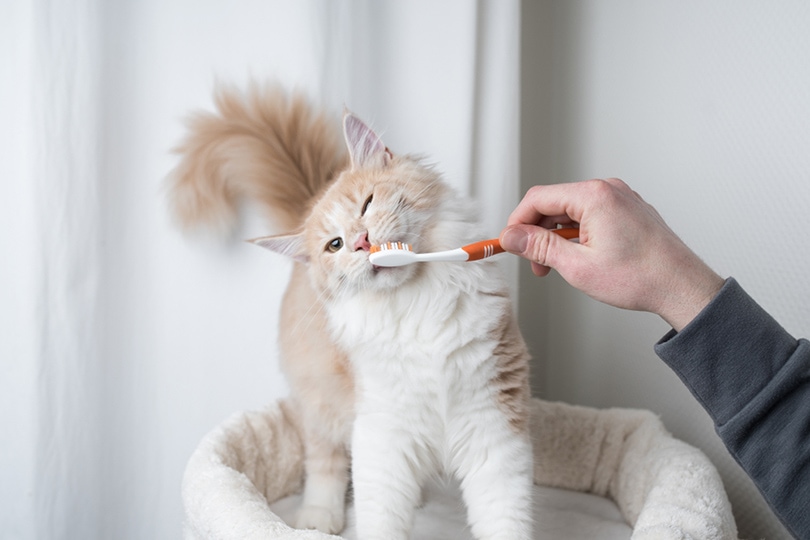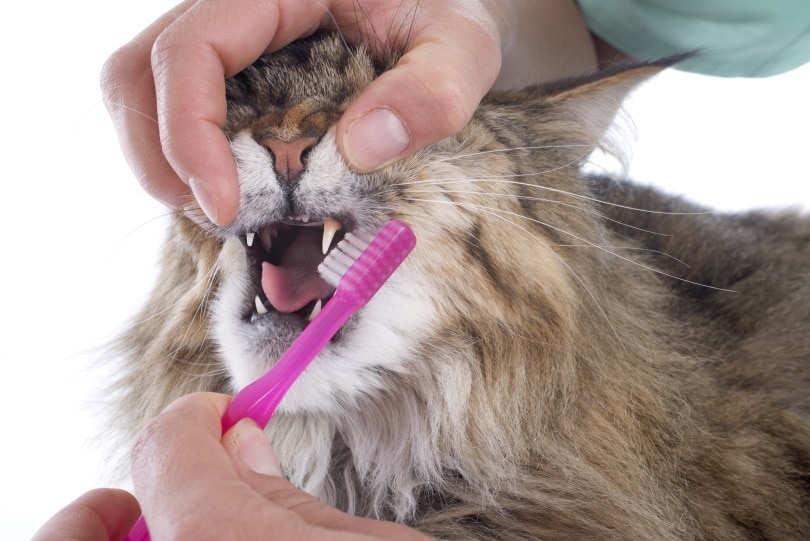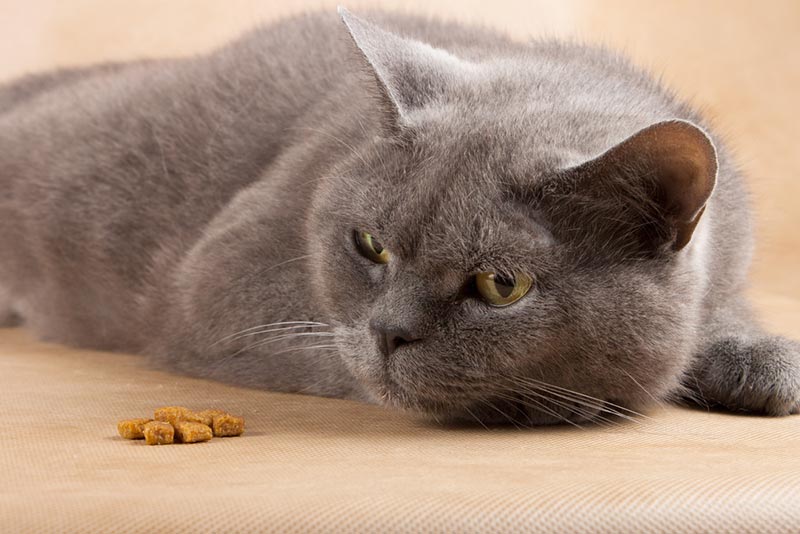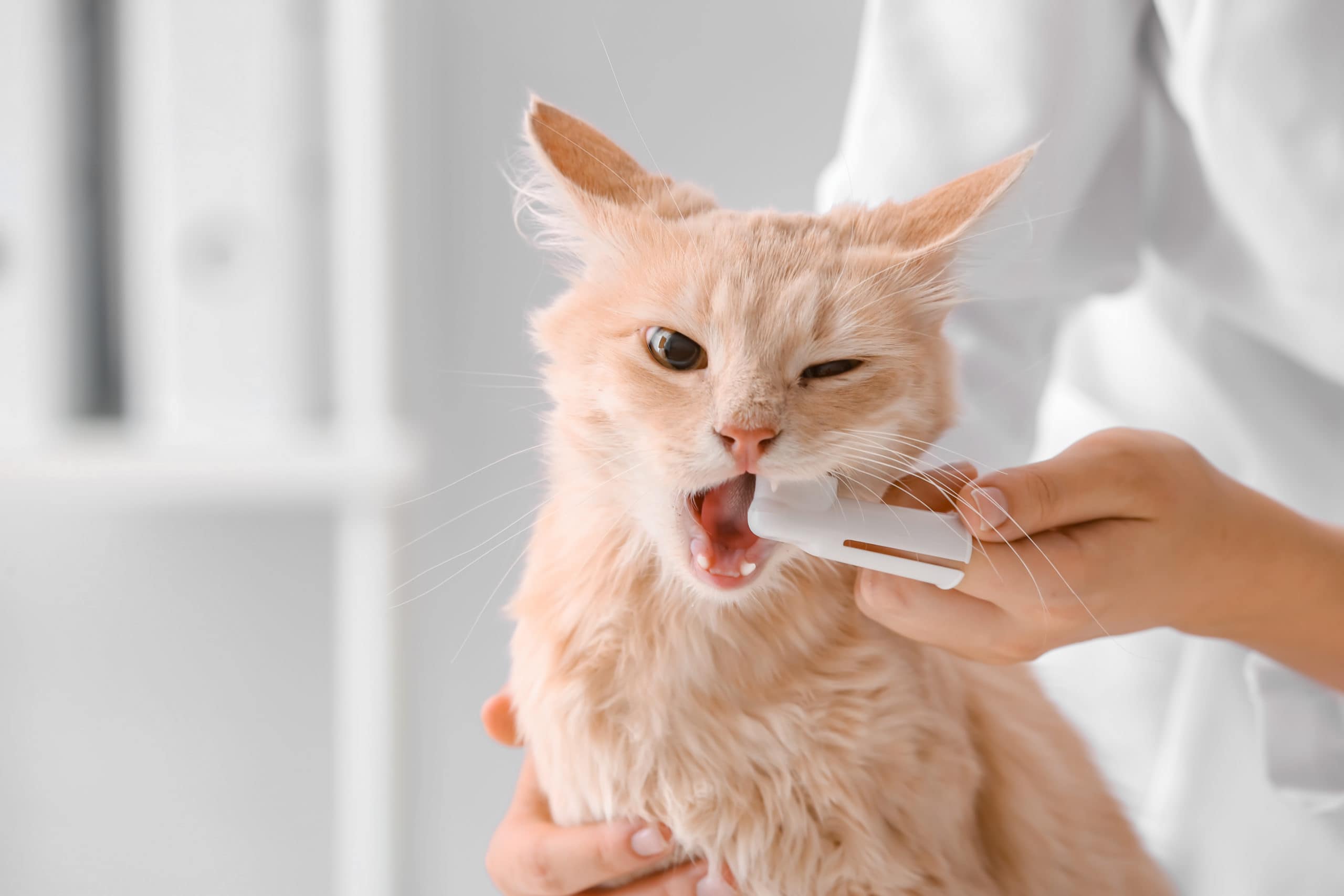
Many pet owners are convinced that they do not need to brush their pets’ teeth, but while it may seem hard to believe, your cat’s teeth do need to be brushed.
Cats’ teeth need care just like ours do, but most people don’t think to brush their cat’s teeth like they do their own. Chewing on dry food and toys does provide care for your cat’s teeth but not enough to prevent the occurrence of dental problems and keep your cat’s teeth clean.
Knowing how to brush your cat’s teeth can help prevent dental problems and unnecessary pain. You should get your cat used to the teeth-cleaning procedure when they’re a kitten because most adult cats aren’t too open to this idea.
Are You Supposed to Brush Your Cat’s Teeth?
Brushing your cat’s teeth is crucial for maintaining their oral health. Unlike humans, cats do not brush their own teeth or use other methods to ensure that their teeth are healthy. This is where their owners must enter the scene.
The good news is that brushing your cat’s teeth should not take more than 30 seconds per cleaning. The more you brush your cat’s teeth, the easier the process will become. Also, in the long term, brushing your cat’s teeth daily is cheaper than treating health problems at the vet.
So, why should you brush your cat’s teeth? First, the plaque that remains on the teeth after each meal accumulates and hardens, and in a few days, it can turn into tartar. In addition to removing the plaque, brushing your cat’s teeth helps prevent periodontal disease (the inflammation of the tissues that support the teeth, which can destroy the jaw bone) and tooth loss.
The plaque that accumulates in your cat’s mouth can also lead to gingivitis and oral infections. In severe cases, bacteria from the mouth can spread into the body, affecting organs such as the heart.

Do Vets Recommend Brushing Cats’ Teeth?
Veterinarians recommend brushing cats’ teeth to avoid dental diseases and their complications. Regardless of the stage of tartar, your cat’s teeth should be brushed every day or at least every 2–3 days. Even if your cat doesn’t want to stand still, you have to try. After all, it’s about your pet’s health! You can ask for a demonstration to the staff at your vet clinic and just make sure you start the process very gradually and build up the routine over a period of several weeks.
Always use special toothpaste for cats, a toothbrush/finger toothbrush, or gauze. Human toothpaste contains too much fluoride and other unsafe ingredients for cats (such as xylitol, an artificial sweetener) that might lead to various health problems if swallowed.
If your cat’s gums are bleeding, their breath becomes foul smelling, or the tartar covers a large surface of the teeth, it is essential to visit the veterinarian before you start brushing your cat’s teeth. It is possible that your cat is suffering from severe dental disease, and touching their mouth or brushing their teeth at that stage could do more harm than good. If that is the situation, your vet may recommend some medication or even a dental cleaning procedure under anesthesia before you attempt to brush your cat’s teeth at home.
What if I Don’t Brush My Cat’s Teeth?
If you don’t brush your cat’s teeth, they can start developing various dental problems.
Most dental problems start from plaque or tartar accumulation. Food residue creates a sticky film on the teeth that favors the development of bacteria, resulting in plaque. If the plaque is not removed in a few days, it will calcify and tartar will form. Tartar is initially a thin white or yellowish deposit at the base of the tooth, which has no smell and does not bother the pet. Over time, though, this deposit goes through several stages:
To avoid these problems, it is necessary to take your cat to the vet for mouth health checks and brush your cat’s teeth regularly.

Is It Too Late to Brush My Cat’s Teeth?
It is never too late to start brushing your cat’s teeth. If you see tartar deposits or your cat has bad breath, take them to the veterinarian for a dental cleaning. You can start a teeth brushing routine after the procedure.
Do not try to remove the tartar by yourself at home. It is rock hard, and you risk fracturing your cat’s teeth or causing other problems. This procedure should only be performed by a veterinarian with special equipment.

How Often Should a Vet Clean My Cat’s Teeth?
You can take your cat for a dental checkup once or twice a year, depending on your cat’s diet and how often you brush their teeth. In other cases, the veterinarian will recommend how often these dental checkups should be done.
If you notice dental problems (slow eating, poor appetite, bad breath, tartar, blood, loose teeth), take your cat to the vet immediately.
How to Brush Your Cat’s Teeth
Brushing your cat’s teeth will not be easy until you get your pet used to this procedure. With calmness, patience, and love, you will succeed!
To start the procedure, you need someone to hold your cat, or you can wrap them in a towel (if they don’t want to stand still).
If your cat starts to struggle or cry, stop the procedure and let them calm down. Resume the operation when your cat has relaxed again.
Conclusion
Brushing your cat’s teeth is not easy, especially if your pet is not used to this procedure. This operation is important, though, because it can prevent plaque and tartar, the accumulation of which can lead to serious health problems.
You should brush your cat’s teeth every day or at most, every 2–3 days. Use only special toothpaste for cats. Otherwise, you risk making your pet sick. Brush your cat’s teeth gently for about 30 seconds. If you think that something is wrong with your cat’s teeth, go to the vet.
Featured Image Credit: Nils Jacobi, Shutterstock








